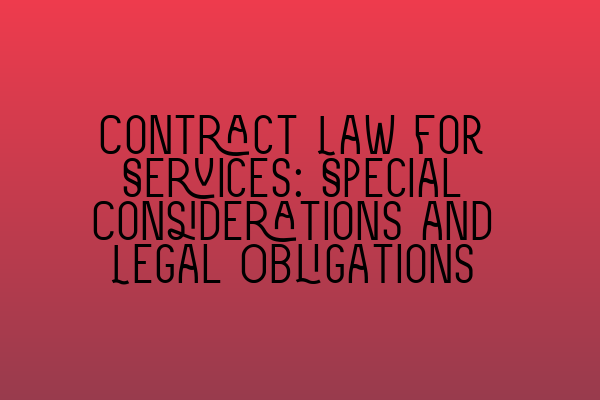Contract Law for Services: Special Considerations and Legal Obligations
Contract law forms the foundation of any transaction or agreement between parties. When it comes to service contracts, there are special considerations and legal obligations that both the service provider and the client need to understand and adhere to. In this article, we will explore the key aspects of contract law for services and provide essential insights to ensure compliance and mitigate legal risks.
1. The Importance of a Well-Drafted Service Contract
A well-drafted service contract is essential to protect the rights and interests of both parties involved. It serves as a legally binding agreement that outlines the terms and conditions, scope of work, payment arrangements, and other crucial details. By having a clearly defined contract, potential disputes can be avoided, and expectations can be managed effectively. To ensure a comprehensive and robust service contract, it is recommended to seek professional legal assistance from experienced solicitors who specialize in contract law.
Need assistance with drafting a service contract? Contact us at SQE Contract Law for expert advice and support.
2. Essential Elements of a Service Contract
A service contract should include the following essential elements:
- Identification of Parties: Clearly state the names and contact details of both the service provider and the client.
- Scope of Work: Define the specific services to be provided and the deliverables expected.
- Payment Terms: Specify the payment structure, including rates, invoicing details, and any additional expenses.
- Term and Termination: Clearly define the duration of the contract and the circumstances under which either party can terminate the agreement.
- Confidentiality: Include provisions to protect sensitive information and trade secrets.
- Intellectual Property: Clarify ownership rights and usage of any intellectual property involved in the contract.
- Dispute Resolution: Outline the procedure for resolving disputes, such as through negotiation, mediation, or arbitration.
- Legal and Regulatory Compliance: Ensure that the services provided comply with relevant laws and regulations.
For a more detailed understanding of the essential elements of a service contract, take a look at our related article: SQE 1 Practice Mocks FLK1 FLK2.
3. Considerations for Independent Contractors
If you are an independent contractor offering services, there are additional considerations to keep in mind. As an independent contractor, you are responsible for your own taxes, insurance, and other statutory requirements. It is crucial to clearly establish the independent contractor relationship in the service contract to avoid any potential misclassification issues.
For further guidance on the legal obligations and considerations for independent contractors, refer to our related article: SQE 2 Preparation Courses.
4. Implied Terms and Service Contracts
In addition to the express terms outlined in a service contract, there may be implied terms that are automatically incorporated by law. These implied terms are based on common law principles and may include obligations such as providing services with reasonable skill and care, completing work within a reasonable timeframe, and ensuring the satisfaction of the client.
It is important for both service providers and clients to be aware of the implied terms that apply to service contracts. Understanding these implied terms can help avoid potential disputes and ensure the fulfillment of legal obligations.
5. Dealing with Breach of Contract
In the event of a breach of contract, it is essential to take prompt and appropriate action to safeguard your rights. If one party fails to fulfill their contractual obligations, the other party may be entitled to remedies such as damages or specific performance. It is advisable to consult with a solicitor specialized in contract law to assess the situation and determine the best course of action.
For more information on dealing with breach of contract, refer to our related article: SQE 1 Practice Exam Questions.
Conclusion
Contract law for services involves special considerations and legal obligations that must be understood and addressed by all parties involved. By having a well-drafted service contract that covers essential elements, complies with legal requirements, and protects the rights of both service providers and clients, potential disputes and legal risks can be minimized.
If you require assistance with service contracts or have any questions regarding contract law, reach out to SQE Contract Law. Our team of experienced solicitors can provide expert guidance and support to ensure legal compliance and protect your interests.
Stay updated with the latest SRA SQE exam dates and preparation courses:
